
Anthony Trollope was an English novelist and civil servant of the Victorian era. Among his best-known works is a series of novels collectively known as the Chronicles of Barsetshire, which revolves around the imaginary county of Barsetshire. He also wrote novels on political, social, and gender issues, and other topical matters.

Mark Pattison was an English author and a Church of England priest. He served as Rector of Lincoln College, Oxford.

The English novel is an important part of English literature. This article mainly concerns novels, written in English, by novelists who were born or have spent a significant part of their lives in England, Scotland, Wales, or Northern Ireland. However, given the nature of the subject, this guideline has been applied with common sense, and reference is made to novels in other languages or novelists who are not primarily British, where appropriate.
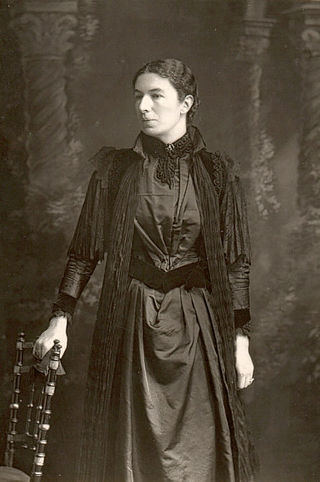
Mary Augusta Ward was a British novelist who wrote under her married name as Mrs Humphry Ward. She worked to improve education for the poor setting up a Settlement in London and in 1908 she became the founding President of the Women's National Anti-Suffrage League.

George Meredith was an English novelist and poet of the Victorian era. At first, his focus was poetry, influenced by John Keats among others, but Meredith gradually established a reputation as a novelist. The Ordeal of Richard Feverel (1859) briefly scandalised Victorian literary circles. Of his later novels, the most enduring is The Egoist (1879), though in his lifetime his greatest success was Diana of the Crossways (1885). His novels were innovative in their attention to characters' psychology, and also portrayed social change. His style, in both poetry and prose, was noted for its syntactic complexity; Oscar Wilde likened it to "chaos illumined by brilliant flashes of lightning". Meredith was an encourager of other novelists, as well as an influence on them; among those to benefit were Robert Louis Stevenson and George Gissing. Meredith was nominated for the Nobel Prize in Literature seven times.
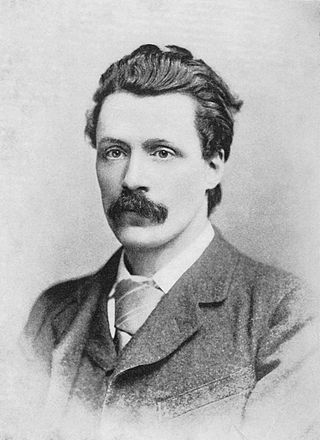
George Robert Gissing was an English novelist, who published 23 novels between 1880 and 1903. In the 1890s he was considered one of the three greatest novelists in England, and by the 1940s he had been recognised as a literary genius. Gissing's best-known works have reappeared in modern editions. They include The Nether World (1889), New Grub Street (1891) and The Odd Women (1893). He retains a small but devoted group of followers.

Sir Walter Besant was an English novelist and historian. William Henry Besant was his brother, and another brother, Frank, was the husband of Annie Besant.

The Hand of Ethelberta: A Comedy in Chapters is a novel by Thomas Hardy, published in 1876. It was written, in serial form, for The Cornhill Magazine, which was edited by Leslie Stephen, a friend and mentor of Hardy's. Unlike the majority of Hardy's fiction, the novel is a comedy, with both humour and a happy ending for the major characters and no suicides or tragic deaths. The late nineteenth century novelist George Gissing, who knew Hardy, considered it "surely old Hardy's poorest book".
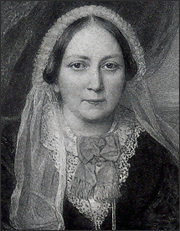
Ellen Price was an English novelist better known as Mrs. Henry Wood. She is best remembered for her 1861 novel East Lynne. Many of her books sold well internationally and were widely read in the United States. In her time, she surpassed Charles Dickens in fame in Australia.
Miss Marjoribanks is an 1866 novel by Margaret Oliphant. It was first published in serialised form in Blackwood's Edinburgh Magazine from February 1865. It follows the exploits of its heroine, Lucilla Marjoribanks, as she schemes to improve the social life of the provincial English town of Carlingford. The late nineteenth century English novelist George Gissing, who read the novel in September 1896, thought it "excellent".
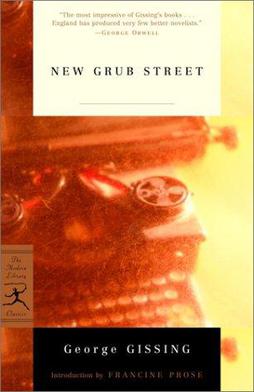
New Grub Street is a British novel by George Gissing published in 1891, which is set in the literary and journalistic circles of 1880s London. The story deals with the literary world that Gissing himself had experienced. Its title refers to the London street, Grub Street, which in the 18th century became synonymous with hack literature, although by Gissing's time, Grub Street itself no longer existed. Gissing revised and shortened the novel for a French edition of 1901.
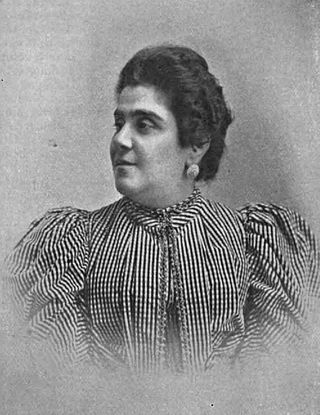
Matilde Serao was an Italian journalist and novelist. She was the first woman called to edit an Italian newspaper, Il Corriere di Roma and later Il Giorno. Serao was also the co-founder and editor of the newspaper Il Mattino, and the author of several novels. She never won the Nobel Prize in Literature despite being nominated on six occasions.
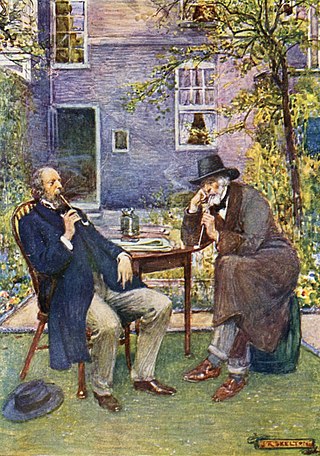
Victorian literature is English literature during the reign of Queen Victoria (1837–1901). The 19th century is considered by some to be the Golden Age of English Literature, especially for British novels. It was in the Victorian era that the novel became the leading literary genre in English. English writing from this era reflects the major transformations in most aspects of English life, from scientific, economic, and technological advances to changes in class structures and the role of religion in society. The number of new novels published each year increased from 100 at the start of the period to 1000 by the end of it. Famous novelists from this period include Charles Dickens, William Makepeace Thackeray, the three Brontë sisters, Elizabeth Gaskell, George Eliot, Thomas Hardy, and Rudyard Kipling.

Morley Charles Roberts was an English novelist and short story writer, best known for The Private Life of Henry Maitland.

Born in Exile is a novel by George Gissing first published in 1892. It deals with the themes of class, religion, love and marriage. The premise of the novel is drawn from Gissing's own early life — an intellectually superior man born into a socially inferior milieu, though the story arc diverges significantly from the actuality.

The Odd Women is an 1893 novel by the English novelist George Gissing. Its themes are the role of women in society, marriage, morals and the early feminist movement.

The Private Papers of Henry Ryecroft is a semi-fictional autobiographical work by George Gissing in which the author casts himself as the editor of the diary of a deceased acquaintance, selecting essays for posthumous publication. Observing "how suitable many of the reflections were to the month with which they were dated", he explains that he "hit upon the thought of dividing the little book into four chapters, named after the seasons".
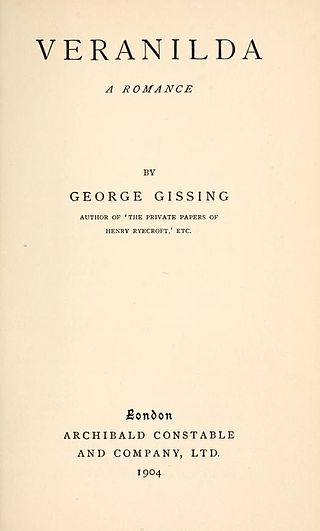
Veranilda: A Romance is a posthumous novel by English author George Gissing. The book was left incomplete at the time of Gissing's death and it was first published in 1904 by Archibald Constable and Company.

Denzil Quarrier is a novel written by the English author George Gissing, which was originally published in February 1892.
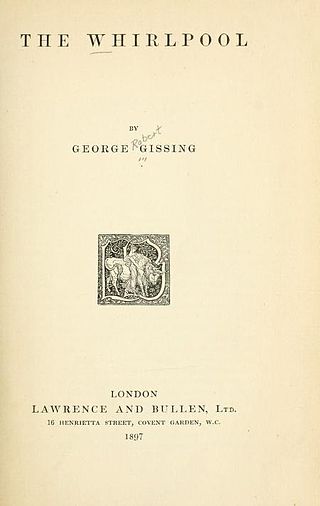
The Whirlpool is a novel by English author George Gissing, first published in 1897.



















